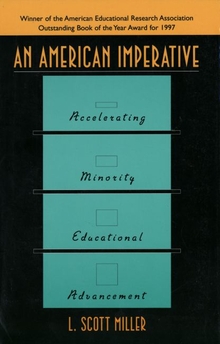An American Imperative
WARNING
You are viewing an older version of the Yalebooks website. Please visit out new website with more updated information and a better user experience: https://www.yalebooks.com
Accelerating Minority Educational Advancement
L. Scott Miller
L. Scott Miller argues that group educational advancement is an intergenerational process shaped by a complex interplay of economic, social, cultural, and institutional factors over time. The current generation of minority and majority students has very different amounts and mixes of home, school, and community resources to draw on, owing to divergent historical experiences and contemporary circumstances. A large-scale, long-term national effort is proposed to ensure that minorities reach educational parity with the majority as soon as possible.
"An enormously useful and highly controversial book. As a black man who teaches at a university, I am aware of the continuing disparities between black and white achievement scores even at elevated education and income levels. Miller's statistics tell us that we are getting the outcomes we should have expected in a culture that has had racism near its core for close to four centuries. He is clearly correct in paying attention both to the great weight of history and to the huge impact of family economics."—Roger Wilkins, George Mason University
"An American Imperative is as important as An American Dilemma was fifty years ago. With respect to education and social welfare policy, this book may well become the nation's principal intellectual reference."—Edmund W. Gordon, Yale University
"An excellent text for class use and is perhaps the best overview of current debates. . . . Miller has made an important contribution."—Grace Kao, American Journal of Sociology
"An American Imperative is well-written and well-researched. It relies upon statistical data to confirm or disconfirm many of the beliefs and attitudes about student performance. This is, in fact, the book's strength. Miller draws upon date, not speculation, to support his points. . . . It conceivably will emerge as an undisputed primer for educational social policy discourse."—Vernon C. Polite, Journal of Curriculum Studies
"At a time when programs aimed at the poor and minorities are under intense attack, no other recent work seems to make as important a scholarly argument as Miller's for the continued and increased public investments for these groups."—James M. McPartland, Contemporary Sociology
Publication Date: September 23, 1997








